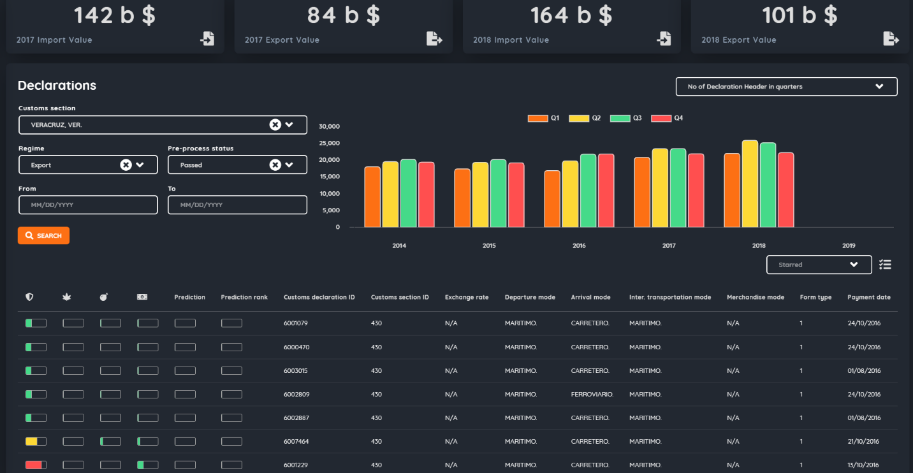TTEK’s proprietary Customs Risk Management Module, RiskLab Analyst™ is a cargo and declaration targeting and selectivity system designed to identify high-risk shipments to Customs and other Border authorities. The system measures the trust and credibility of traders, shipments, commodities, and other supply chain data using an artificial intelligence framework that draws from deductive and inductive logic, and further layers this framework with predictive modelling algorithms. The outcome is the World’s preeminent risk engine for border, supply chain, and trade data.
The World’s preeminent risk engine for border, supply chain, and trade data.
Optimize and Strengthen Border Controls. Make Important Border Decisions Supported by Artificial Intelligence.
Using Artificial Intelligence, RiskLab Analyst™ automatically analyzes and risk assesses trade data including Single Administrative Documents, Importer Declarations, and Cargo Data. The system then presents the transactional data with ensemble risk scoring in order of high, medium, and low risk scores. The decision support framework ensures that the right data is being used at the right time to inform officers and analysts on high risk shipments arriving at their sovereign border. high-risk shipments can be referred to inspection teams using TTEK’s proprietary mobile application called RiskLab™ Inspector.
Inspections and enforcement actions are collected in real time and feed the machine learning algorithms to automatically adjust and configure the risk scoring -dynamically and in real time.
Features
*Not all inclusive. Contact us for a full feature list.
Contains a customizable, integrated workflow for risk analysis & mitigation procedures, including coordinating with other government agencies.
Contains end-user configurable controls on inspections including what inspection types and officers are authorized per checkpoint
Ingests ASYCUDA data through either a database connection or API
Maps all internal data to the latest WCO data model, including performing transformations such as datatype conversion or numeric to string conversions.
Connects to tariff classification services to compare goods descriptions with declared harmonized tariff system codes.
Provides a historical data-processing engine to identify trends such as first-time importer and first-time importer of a specific commodity.
Includes a deductive and inductive rule editor usable by an end-user.
Provides several thousand default risk rules, across a variety of risk indicators and threat rulesets, with an additional sovereign specific ruleset.
Structures risks, on a real-time basis, into "scorecards" for pre-arrival cargo, post-arrival cargo, vessel and crew.
Supports implementation of an operational Risk Management Framework with a defined hierarchy of Threat Rulesets, Risk Categories, Rationales and Scores.
Integrates with modern Electronic Single Window Platforms and Customs Trade Import Processing Systems including ASYCUDA ++ and ASYCUDA World.
Collect and Use Inspection Data in Real Time to Strengthen Your Analytics…
RiskLab Inspector™ is a field inspection application designed to collect outcome data from inspections -and dynamically configure and tune the risk scoring in RiskLab Analyst…. all in real time.
Inspection Management
The physical inspection of goods that cross the border is fundamental to the assessment and verification of goods. The inspection process includes planning and scheduling inspections, conducting the inspections and capturing the inspection feedback. This feedback is used to make necessary amendments to declarations and to update and improve Risk Management and profiling rules and processes. RiskLab Inspector™ provides several functions to support this concept:
Electronic Case Management
RiskLab Inspector™ automatically creates an electronic case to manage the collaboration between Customs interventions & inspections with respect to a specific declaration. All inspection information and risk analysis information are stored in this case and can be linked to additional declarations, LPCOs or notices.
Automated work assignment
RiskLab Inspector™ supports randomly assigning inspection cases to Customs inspection team pools based on required inspection type.
RiskLab Inspector™ also supports the manual assignment of inspection cases to specific officers by analysts for situations requiring manual controls. With an expanded multi-agency license, these assignees can include officers from Other Government Agencies (OGA)s as well to apply OGA-specific controls and processes. This routing can be controlled through the BRMS and workflow configuration.
Generation of Inspection Report(s)
RiskLab Inspector™ contains pre-formatted inspection report templates to provide structured mechanisms for recording inspection outcomes. These templates will be configurable by OGA and per Customs Trade System installation to enable the tailoring of inspection end results to a given installation.
All inspection reports will be attached to the inspection case for which they were populated, and similarly outputs such as X-ray images, or reports from 3rd party systems can be attached to the same case.
Inspection Feedback
Utilizing the core Customs Trade System inspection templates will allow RiskLab Inspector™ to feed inspection results back into the risk assessment process in a controlled manner as specific fields within templates can be used as inputs into BRMS rules to perform calculations and updating scoring tables as a result of those calculations.
Detailed Audit Logs
System audit trail records all inspection case events, available to authorised officials for quality assurance and monitoring purposes.
Mobile Device Capacity
Due to the nature of inspections and the need for field inspection capabilities outside of ports, the RiskLab Inspector™ application will be fully capable of being utilized on the majority of mobile devices. Refer to the section on Multi-Platform support for more details on the specific device requirements.





